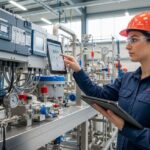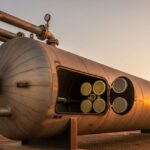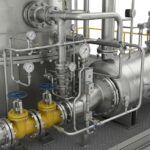Introduction
The global energy landscape is undergoing a significant transformation, driven by the urgent need to transition towards sustainable and renewable energy sources. Among the most promising solutions is the Hydrogen Energy Storage System using an O₂-free Advanced Electrolyzer System (AES). This article delves into the mechanics, benefits, and economic implications of hydrogen storage and production, emphasizing the advantages of utilizing AES technology.
Quiz on Hydrogen Energy Storage
1. What is the primary function of the Advanced Electrolyzer System (AES)?
Choose the correct answer:
Correct Option: B
Explanation: The primary function of the Advanced Electrolyzer System (AES) is to convert surplus energy into hydrogen gas. This process allows for the storage of renewable energy, which can be utilized as a clean fuel source when needed. For example, excess electricity from wind or solar sources can be transformed into hydrogen, helping balance energy supply and demand.
2. Which of the following is a key benefit of using hydrogen as an energy storage solution?
Choose the correct answer:
Correct Option: C
Explanation: One of the key benefits of using hydrogen as an energy storage solution is its long-term storage capability. Unlike batteries that are effective for short-duration applications, hydrogen can be stored for extended periods, making it ideal for seasonal energy storage. For instance, surplus energy generated in the summer can be stored as hydrogen and utilized during the winter months.
3. How does AES improve the efficiency of hydrogen production?
Choose the correct answer:
Correct Option: B
Explanation: AES improves the efficiency of hydrogen production by eliminating oxygen co-production, which reduces the energy input required for the process. This leads to lower hydrogen production costs, achieving efficiencies that can significantly outperform traditional water electrolysis methods. For example, AES can reduce energy consumption to below $4 per kilogram of hydrogen produced.
Complete Course on Piping Engineering
Basics, Codes & Standards, Layout, Materials & Stress Analysis
Overview of Hydrogen Energy Storage
Hydrogen energy storage refers to the process of converting surplus energy into hydrogen gas, which can be stored and used as a clean fuel source. The AES represents a leap forward in this field by dramatically reducing the energy required for hydrogen production compared to conventional water electrolyzers.
Key Benefits of Hydrogen Energy Storage
- Sustainability: Hydrogen is a clean fuel, producing only water when burned or used in fuel cells.
- Scalability: The hydrogen production process can be scaled to meet varying energy demands.
- Long-term Storage: Hydrogen can be stored for extended periods, unlike batteries, making it ideal for seasonal energy storage.
- Versatility: Hydrogen can be utilized in various applications, including transportation, heating, and electricity generation.
Understanding the Advanced Electrolyzer System (AES)
The Advanced Electrolyzer System is designed to improve the efficiency and cost-effectiveness of hydrogen production. T2M’s AES laboratory tests demonstrated remarkable results:
- Energy Efficiency: The energy consumption of the AES ranges between 5 to 15 kWh/kg of hydrogen produced, significantly lower than traditional methods, achieving an estimated hydrogen production cost of less than $4/kg.
- Hybrid Storage Solutions: By integrating AES with battery storage, a comprehensive energy storage solution is achievable. The AES can convert surplus electricity into hydrogen, providing a backup source of energy when needed.
Comparing Energy Storage: Battery vs. Hydrogen
1. Batteries
Batteries are commonly used for energy storage but have limitations when it comes to duration and cost.
- Short-term Storage: Effective for short-duration applications but costly for extended periods.
- Levelized Cost of Energy (LCOE):
- Short-duration (< 8 hours): $90-$100/MWh
- 24-hour storage: > $200/MWh
- 30 days of storage: $5,000/MWh
| Duration of Storage | LCOE ($/MWh) |
|---|---|
| < 8 hours | $90 – $100 |
| 24 hours | > $200 |
| 30 days | $5,000 |
2. Hydrogen
In contrast, hydrogen energy storage, particularly through AES, presents a more viable long-term solution.
- Cost-Effectiveness: The conventional hydrogen production via water electrolysis costs about $125/MWh, whereas AES estimates an LCOE of just $50/MWh.
- Capacity: The potential of utilizing curtailed electricity can yield approximately 70,000 tons of hydrogen monthly from 700 GWh, valued at around $350 million.
Advanced Electrolysis Using Alternate Hydrogen Carriers
One significant advancement in hydrogen production is the use of alternate hydrogen carriers that eliminate oxygen co-production. This approach drastically reduces energy consumption:
- Energy Efficiency: The elimination of oxygen production lowers the energy input, achieving hydrogen production costs below $4 per kilogram.
Examples of Oxygen-Free Hydrogen Carriers
- Syngas: A mixture of hydrogen, carbon monoxide, and carbon dioxide.
- Biogas: Generated from organic materials.
- Tail Gases: Produced in industrial processes like steam methane reforming and steel manufacturing.
- Methane (CH₄) and Ammonia (NH₃): Both serve as alternative carriers for hydrogen production.
Performance and Economic Advantages of AES
The Advanced Electrolyzer System (AES) offers multiple advantages over traditional water electrolysis:
- Increased Efficiency: AES aims to double the round-trip electrical efficiency, improving it from less than 40% to more than 80%.
- Reduced Capital Costs: The capital cost for AES is approximately 50% lower than conventional systems.
- Lower Electrical Losses: By avoiding oxygen co-production, AES enhances process efficiency, significantly lowering electrical losses.
- Enhanced Value from Fossil Assets: AES optimizes existing fossil fuel plants by converting waste products into high-value hydrogen and dispatchable zero-carbon power.
Conclusion
The Hydrogen Energy Storage System using the O₂-free Advanced Electrolyzer System (AES) stands at the forefront of sustainable energy solutions. With its ability to drastically reduce hydrogen production costs and improve efficiency, AES presents a promising future for energy storage and production. As the world shifts towards renewable energy sources, technologies like AES will be vital in meeting the energy demands of the future.
FAQs
- What is the Advanced Electrolyzer System (AES)?
- The AES is a cutting-edge technology designed to produce hydrogen with significantly reduced energy consumption and costs compared to conventional methods.
- How does hydrogen energy storage work?
- Hydrogen energy storage involves converting excess electricity into hydrogen gas, which can be stored and later used for power generation or other applications.
- What are the economic benefits of AES?
- AES offers lower hydrogen production costs, improved energy efficiency, and reduced capital investment compared to traditional electrolyzers.
- Why are oxygen-free hydrogen carriers important?
- Using oxygen-free carriers decreases the energy required for hydrogen production, making it more cost-effective and efficient.
- How does AES compare to battery storage?
- AES is more suitable for long-term energy storage, whereas batteries are effective for short-duration applications but become prohibitively expensive for extended periods.
Check 100+ Free Courses on EPCLAND
Popular courses by EPCLAND on Piping Engineering:
- Complete Course on Piping Engineering
- Piping Layout Engineering
- Piping Material Engineering
- Piping Stress Analysis
- All Courses Published on EPCLAND Platform
Top Short Courses on valves by EPCLAND:
- 14 Components of API 6A Gate Valve
- 14 Components of API 6D Valves
- 58 Components of API 602 Gate Valves
- 17 Components of API 600 Gate Valves
- Valve Material Specifications (VMS) – Comprehensive Guide
Important Links
- Video Series on Comparison of Piping Items: Check here
- Join Biggest Telegram Community of Piping Engineering: Click Here
- Subscribe YouTube channel: Click Here
- Check All Published courses: Click Here
- Read published technical Articles: Click Here
#Epcland #Pipingcourses #PIpingengineering #pipingonlinecourses #atulsingla









